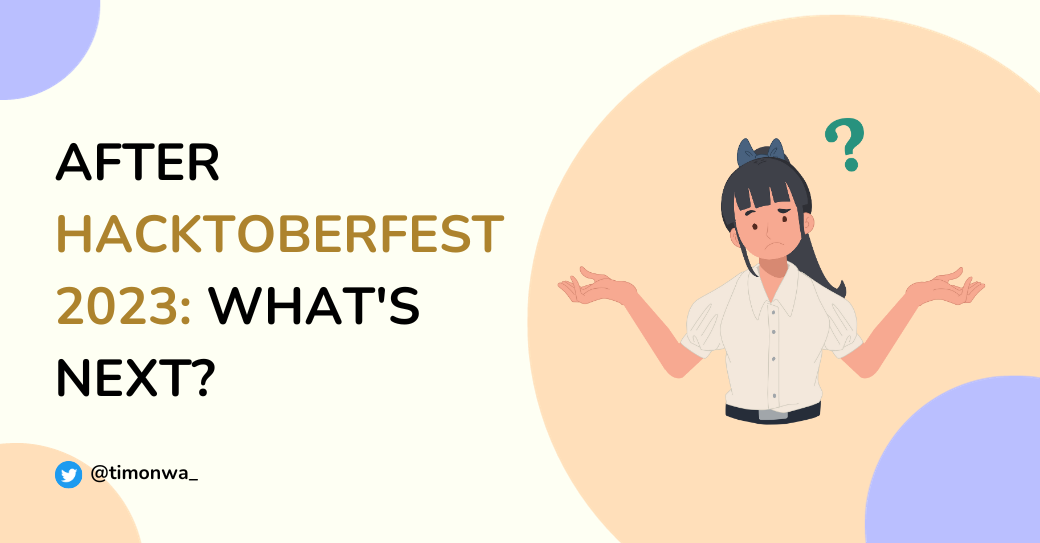After Hacktoberfest 2023: What's Next?
 Timonwa Akintokun
Timonwa AkintokunTable of contents
- Wrapping up the series
- 1. Embarking on Your Open Source Adventure: A Beginner's Guide to Hacktoberfest 2023
- 2. Introduction to Hacktoberfest: A Celebration of Open source
- 3. Getting Ready for Hacktoberfest: Preparing for Your Open source Journey
- 4. Finding Your First Hacktoberfest Project: A Step-by-Step Guide
- 5. Making Your First Open-source Contribution: A Beginner's Guide
- 6. Hacktoberfest Etiquette and Best Practices: A Guide for First-time Contributors
- 7. Understanding the Open Source Community: A Guide For The Newcomers
- What's Next After Hacktoberfest?
- Tips for Maximizing Your Hacktoberfest Experience
- Conclusion
- Connect with me 🔗

Hi there! Welcome to the final article in our Hacktoberfest series. It's been an exciting journey throughout our Hacktoberfest 2023 series. We hope you've enjoyed the journey and are ready to take the next step. Congratulations on completing the journey if you have followed along since the series began. If you are joining us, welcome! We're glad you're here. You can catch up on the previous articles in the series here: The Beginners Guide to Hacktoberfest.
We're closing this series today, but it's only the beginning of your open-source adventure. This final article will wrap things up, discuss what comes after Hacktoberfest, and provide valuable tips to continue your open-source journey.
Before we move forward, let's take a moment to reflect on our Hacktoberfest series. We've covered a lot of ground, from the basics of open source to the intricacies of making your first contribution. Let's take a quick look at the topics we've explored so far:
Wrapping up the series
1. Embarking on Your Open Source Adventure: A Beginner's Guide to Hacktoberfest 2023
In this series opener, we set the stage for a thrilling adventure into the world of Hacktoberfest. We introduced the concept and its significance, emphasizing the inclusivity of this open-source celebration. With an invitation to explore, we started our journey with excitement.
2. Introduction to Hacktoberfest: A Celebration of Open source
In our second article, we delved deeper into the heart of Hacktoberfest. We defined this month-long coding festival, tracing its origins to DigitalOcean in 2013. The beauty of Hacktoberfest lies in its openness to all, regardless of their tech prowess. It's a global call to unite in coding, collaborating, and community-building. We also discussed the importance of open source and how it's transforming the world.
3. Getting Ready for Hacktoberfest: Preparing for Your Open source Journey
At the third stop, we prepared for our upcoming Hacktoberfest adventure. We emphasized the importance of "Preptember," where aspiring contributors can equip themselves with the necessary tools and get acquainted with the open-source landscape. We guided readers in setting up their GitHub or GitLab accounts and configuring Git on their local machines. Plus, we highlighted the significance of a good code editor.
4. Finding Your First Hacktoberfest Project: A Step-by-Step Guide
The fourth article brought us closer to the main event by addressing a common challenge for newcomers: finding the right project to contribute to. We discussed the intricacies of GitHub and GitLab, the platforms Hacktoberfest tracks for contributions. Readers learned how to explore projects, what to look for when choosing one, and the vital role of README files, licenses, activity levels, and more. We concluded with valuable tips for first-time contributors, encouraging them to start small, seek community, ask for help, and, most importantly, have fun.
5. Making Your First Open-source Contribution: A Beginner's Guide
In our fifth installment, we took a hands-on approach. We guided you through the process of making your first open-source contribution. From forking a repository to creating a new branch, making changes, and finally opening a pull request, we demystified the jargon and made contributing a breeze for newcomers.
6. Hacktoberfest Etiquette and Best Practices: A Guide for First-time Contributors
The sixth article explored the etiquette and best practices for a successful Hacktoberfest journey. We discussed how to be a courteous and effective contributor, emphasizing the importance of respectful communication, patience, and embracing feedback. We also highlighted the significance of quality contributions and the value of collaboration.
7. Understanding the Open Source Community: A Guide For The Newcomers
Finally, we explored the etiquette and best practices for a successful Hacktoberfest journey. We discussed how to be a courteous and effective contributor, emphasizing the importance of respectful communication, patience, and embracing feedback.
We hope you've found these articles insightful and that they've encouraged you to take part in this fantastic open-source festival.
What's Next After Hacktoberfest?
Remembering that Hacktoberfest is a month-long event, it's essential to know what to do afterward. Here are some tips to help you continue your open-source journey:
1. Reflect on Your Experience
Take a moment to think about your Hacktoberfest experience. What did you learn? What challenges did you face? What successes did you achieve? Reflecting on your journey can help you set meaningful goals for your future contributions.
2. Stay Engaged with the Community
The open-source community is active year-round. Continue to participate in discussions, forums, and chats. Engaging with the community is an excellent way to stay updated on projects and discover new contributing opportunities.
3. Explore New Projects
Now that you've dipped your toes into open source consider exploring new projects beyond Hacktoberfest. Find projects that align with your interests and expertise. You don't have to limit your contributions to just one event; open source is an ongoing endeavor.
4. Contribute Regularly
Don't stop at Hacktoberfest. Make open-source contributions a regular part of your routine. Whether fixing bugs, improving documentation, or developing new features, consistent contributions will sharpen your skills and make a lasting impact.
5. Mentorship and Learning
Consider joining mentorship programs or engaging with experienced contributors. Learning from others and mentoring newcomers can be incredibly rewarding. It's an opportunity to give back to the community while expanding your knowledge.
Tips for Maximizing Your Hacktoberfest Experience
Here are some final tips to make the most of your Hacktoberfest participation:
Quality Over Quantity: Focus on meaningful contributions rather than trying to meet a specific quantity goal.
Collaborate: Engage with project maintainers and other contributors. Collaboration leads to better results.
Learn Continuously: Open source is a constant learning experience. Keep exploring new technologies and tools.
Share Your Knowledge: Write blog posts, tutorials, or documentation to share what you've learned.
Have Fun: Enjoy the process. Open source is not just about code; it's about building a supportive community.
Conclusion
As this series ends, we hope you've gained valuable insights into the open-source world. Remember, your contributions can make a difference, no matter how small. There's so much more you can achieve. So stay connected with the community, keep learning, and continue to be an integral part of this vibrant world of collaboration.
Thank you for joining us in this series. Your dedication to open source is commendable, and we look forward to seeing your continued success. Until next time, happy coding and contributing!

Connect with me 🔗
Follow me on Twitter, LinkedIn, and Instagram to stay updated with my latest content.
If you like my notes and want to support me, you can buy me a coffee on ByMeACoffee. I love the taste of coffee. 😍
For other ways to support me, visit my Sponsorship Page.
Subscribe to my newsletter
Read articles from Timonwa Akintokun directly inside your inbox. Subscribe to the newsletter, and don't miss out.
Written by

Timonwa Akintokun
Timonwa Akintokun
Hi, I'm Timonwa! I write articles on web development that help other developers learn more easily. These articles include beginner-friendly tutorials, open source, technical writing, and more.